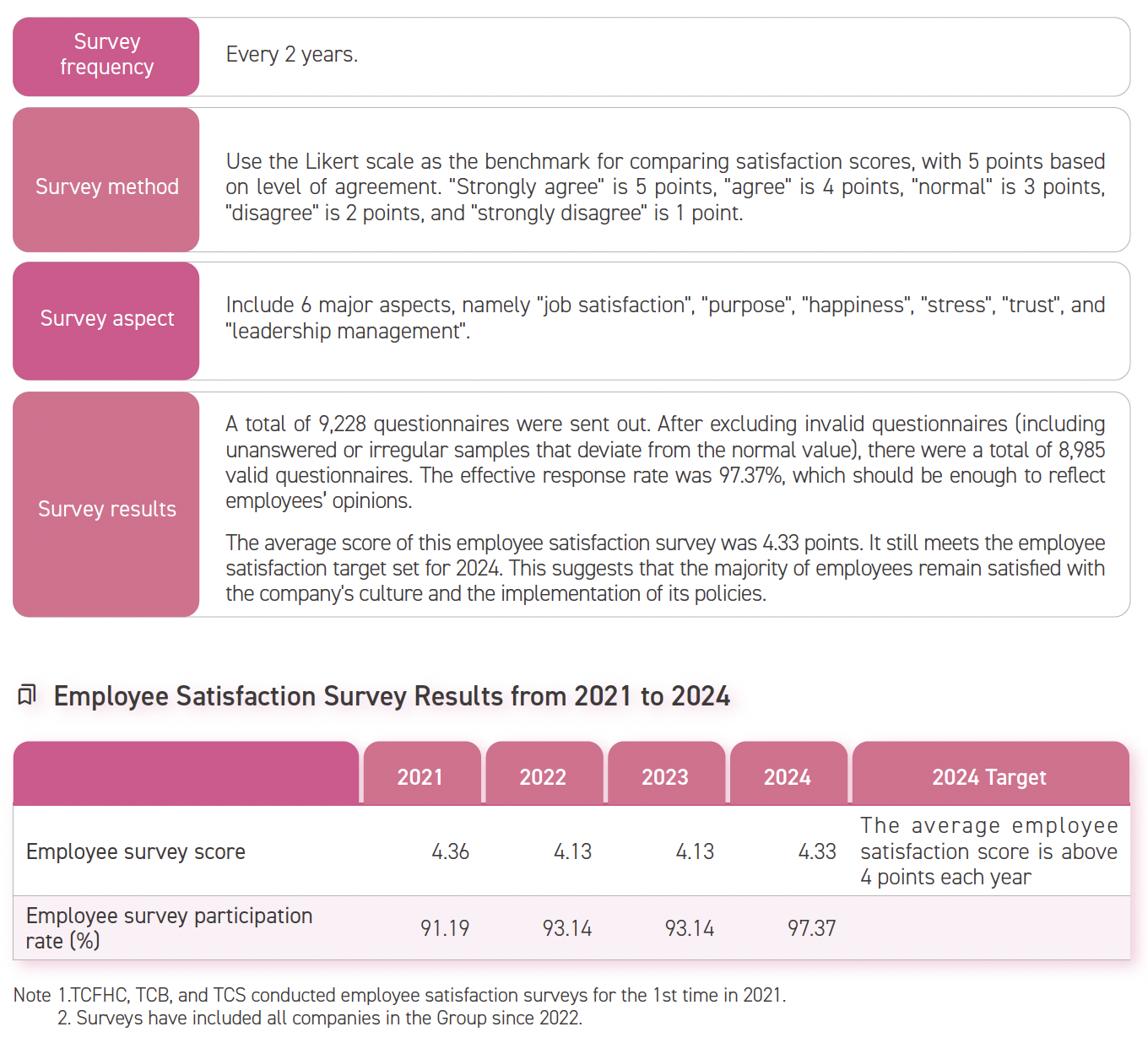Human Rights Policy
The Group adheres to international human rights standards, including the “United Nations Universal Declaration of Human Rights”, the “United Nations Global Compact”, and “International Labour Organization Conventions”. It has established a human rights policy and code of conduct applicable to all subsidiaries within the Group. To demonstrate its commitment to upholding, respecting, and protecting human rights, the president, on behalf of all employees, has signed a human rights statement, publicly declaring the Company’s support for and compliance with its human rights policy. The Group also expects its suppliers, clients, and other partners to uphold the same standards and work together to enhance awareness of human rights issues. The Group has no operating sites or suppliers with significant risks of forced or compulsory labor.
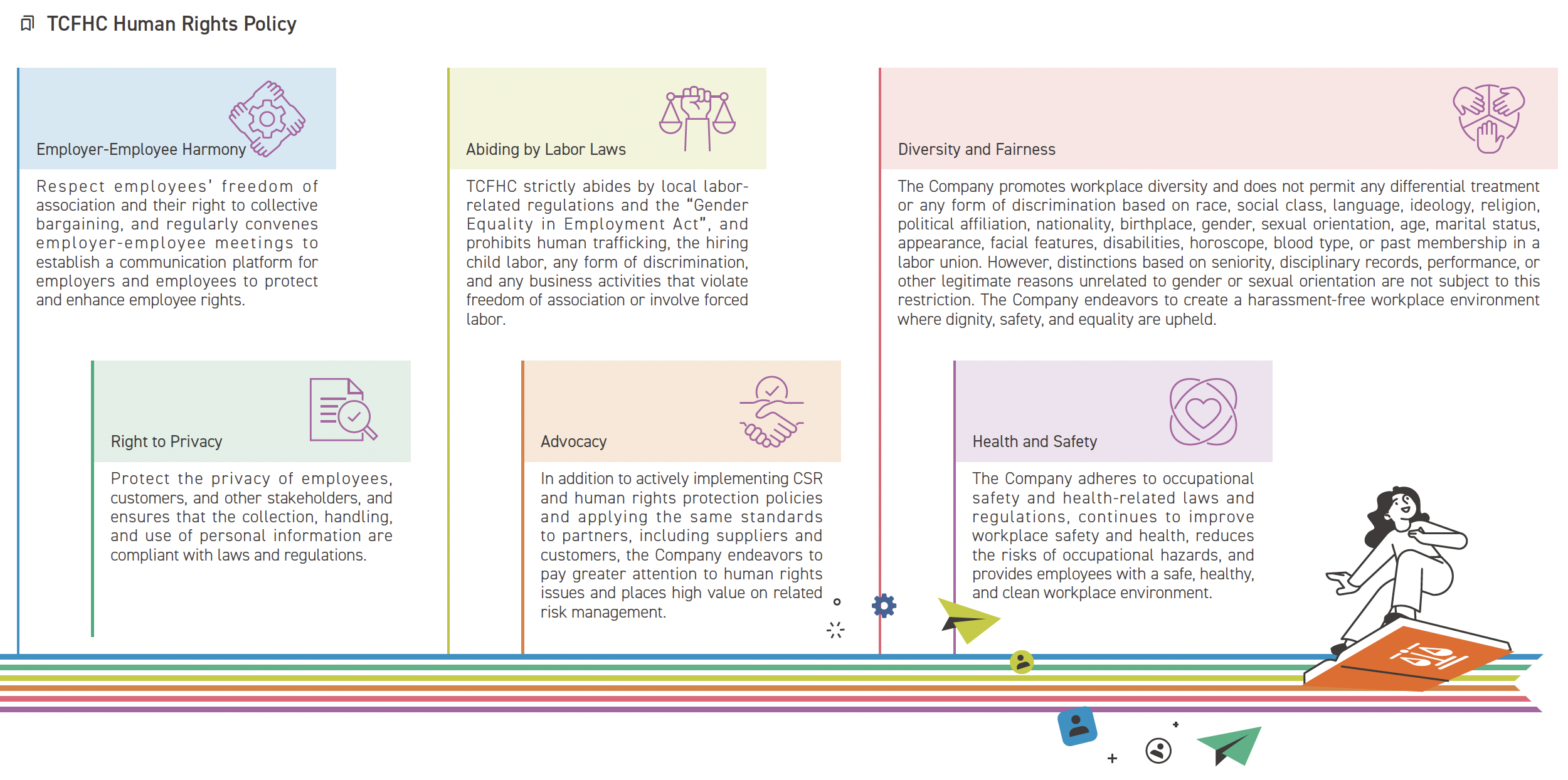
For the sake of eliminating gender discrimination and promoting substantive gender equality, TCFHC is devoted to advancing gender equality policies. Gender equality and human rights education and training courses are planned for employees (including newcomers) on a yearly basis. In 2024, TCB further expanded gender equality education and training across the entire bank to strengthen employees’ awareness of gender equality. A total of 9,231 participants received the training. Including other Group companies, the total number of participants in gender equality courses reached 9,838, representing a significant increase compared to the previous year. In addition, internal management and complaint resolution are key components of training courses for management, aimed at improving supervisors’ ability to communicate and handle problems. TCFHC is committed to constructing a gender-friendly workplace, establishing many leave and benefit systems that are more favorable than statutory requirements (see Maternity Protection Measures Superior to Statutory Requirements). In 2023, TCFHC participated in the Gender-Equality Index (GEI) assessment for the first time and was certified. In 2024, it was selected for the first time as one of the “Equileap Emerging Markets Gender Equality Enterprises”, becoming the first financial institution in Taiwan to receive this recognition. These honors demonstrate how the Company’s active efforts to implement gender equality policies have gained international recognition.
TCFHC Group has zero-tolerance for both sexual and non-sexual harassment. To prevent the occurrence of sexual harassment and protect the rights and interests of victims, the Company established “Workplace Sexual Harassment Prevention Policies” that strictly prohibit sexual harassment in the workplace. Violators are penalized according to the severity of the situation. In addition to posting anti-sexual harassment literature, the Company also established the “Sexual Harassment Complaint Review Committee”, which consist of external experts who professionally and impartially handle reports of sexual harassment. The Company also established a sexual harassment complaints hotline, establishing an open reporting channel to handle employee complaints with confidentiality, allowing employees to work safely in a workplace environment free of sexual harassment and ensuring diversity and fairness in the workplace.
In 2024, 1 case of sexual harassment occurred within the Group. In accordance with the “Regulations for Prevention, Correction, Complaint, Investigation and Handling, and Punishment of Sexual Harassment at Workplace”, the “Sexual Harassment Complaint Review Committee” was convened to deliberate the case. The sexual harassment incident was investigated based on principles of objectivity, fairness, and professionalism, ensuring that all parties were given full opportunities to present their statements and defenses. Following the case review, appropriate disciplinary action was taken against the offender. The case has been properly concluded. Additionally, gender equality awareness was reinforced through related courses for management-level employees and new hires to prevent the recurrence of such incidents.
Human Rights Due Diligence
To implement human rights risk management, the Company not only established a Group human rights policy, but also continuously follows up on recent human rights cases and analyzes prominent international human rights issues. Every year, important human rights issues that are highly relevant to the Company are regularly selected as the main assessment items for implementing human rights due diligence on employees and key suppliers, so as to facilitate regular review of human rights risk issues and the formulation of mitigation and remediation measures, with ongoing tracking of improvement outcomes.
Note: For the key supplier human rights due diligence results, refer to the chapter Enrichment for details.
Human Rights Due Diligence Process
In order to fully implement its human rights policy, TCFHC compiles potential and possible human rights issues during operational processes through internal and external communication channels, while monitoring the development trends in human rights issues at home and abroad. The frequency of occurrence and impact of human rights issue-related risks are assessed through questionnaires, which serve as a reference for TCFHC to formulate business policies and welfare measures in the future.
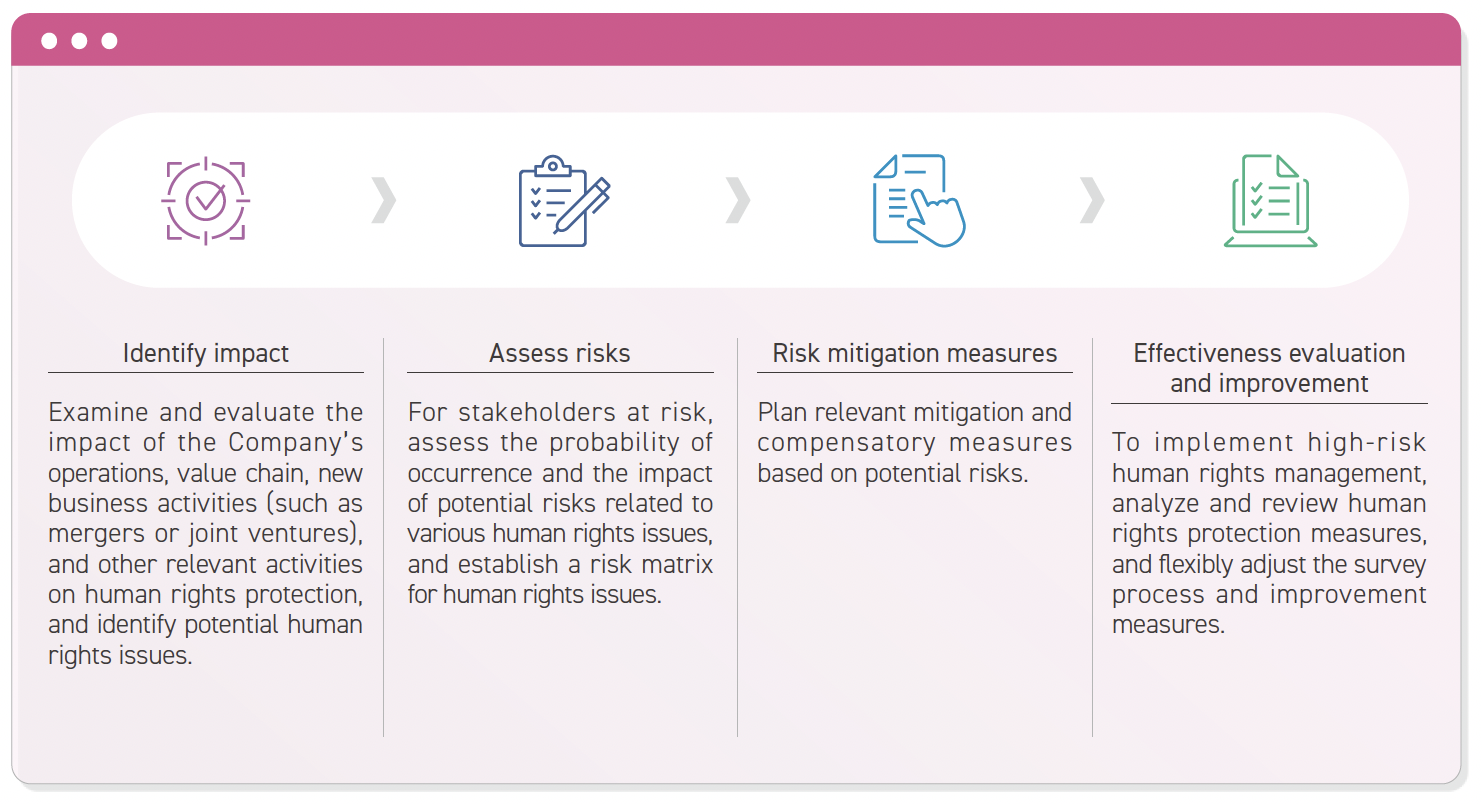
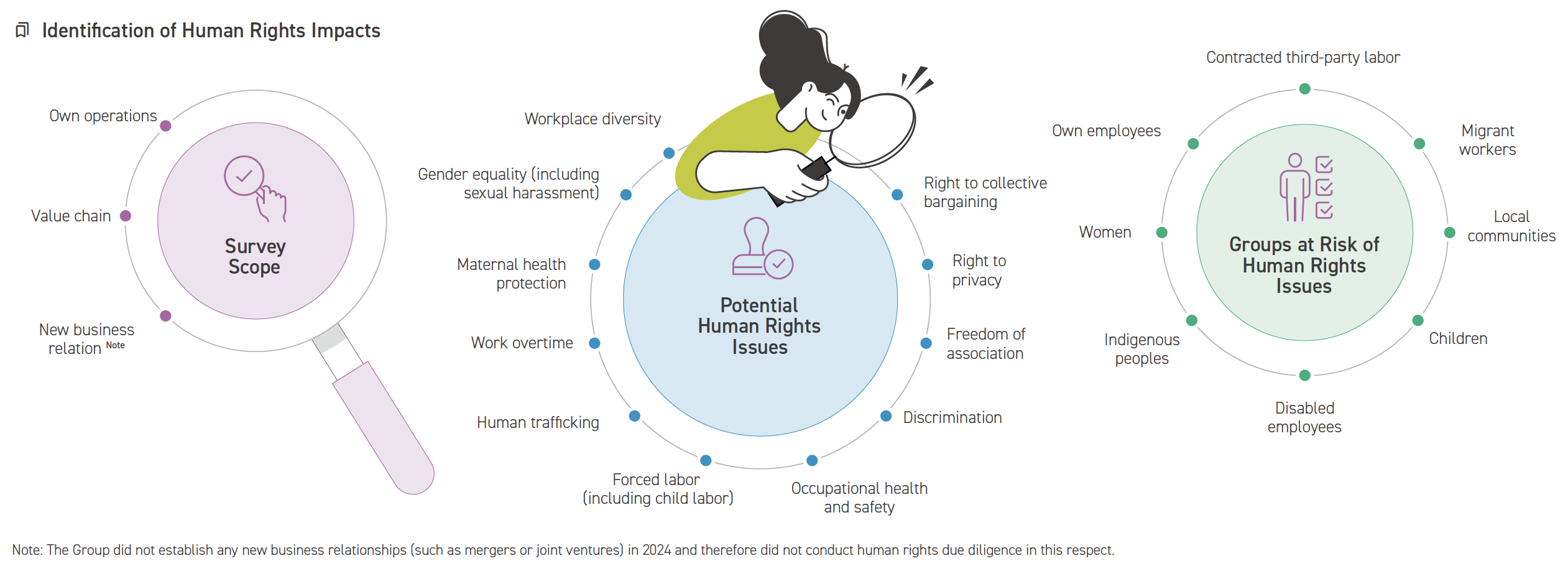
Human Rights Risk Assessment
In 2024, TCFHC Group conducted an employee human rights due diligence survey, focusing on 7 major human rights issues, namely, “workplace diversity”, “gender equality (including sexual harassment)”, “maternal health protection”, “work overtime”, “human trafficking”, “forced labor (including child labor)”, and “occupational health and safety”, compiling 27 potential human rights risk issues. The survey was conducted through questionnaires on the probability of occurrence of these risks and the severity of impact if they occur, to fully understand the possible impact of human rights risk issues and to plan risk mitigation measures as soon as possible.
For the survey, 9,444 questionnaires were given to employees throughout the Group, and 8,815 valid completed questionnaires were collected, resulting in a completion rate of 93.34%. The survey results showed that the occurrence rate and impact of human rights risks were both at a medium to low level. This demonstrates that the Company’s measures to prevent human rights risks are recognized by most employees.
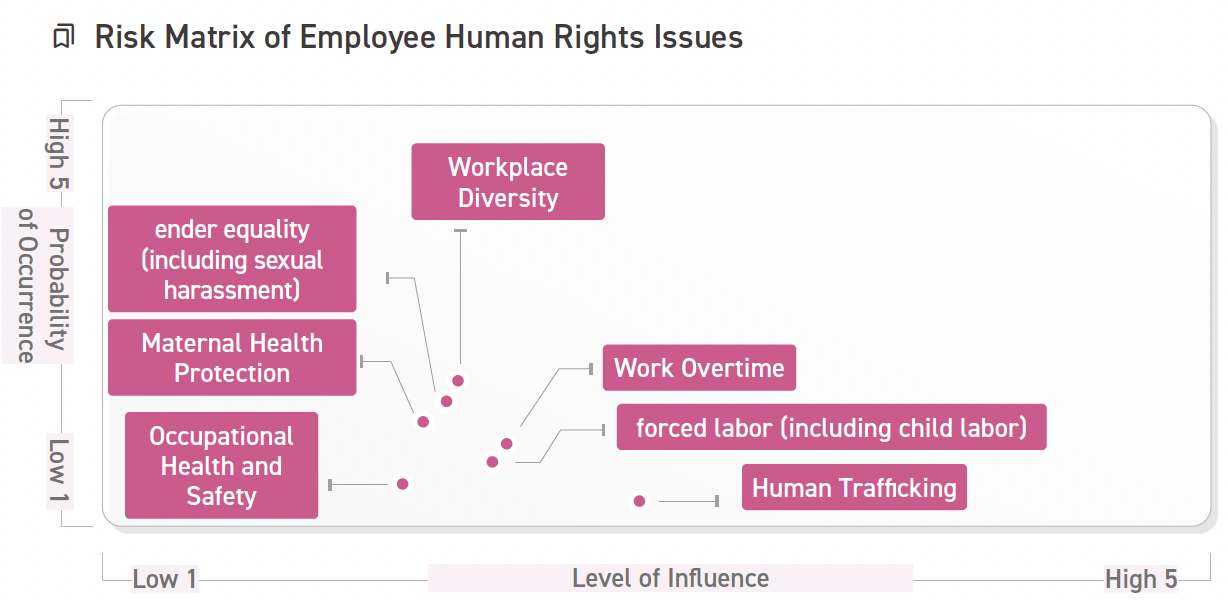
Human Rights Risk Issues and Mitigation Measures
Based on the results of its human rights due diligence, the Company identifies potential human rights issues with relatively higher risk levels and formulates corresponding mitigation measures as follows:
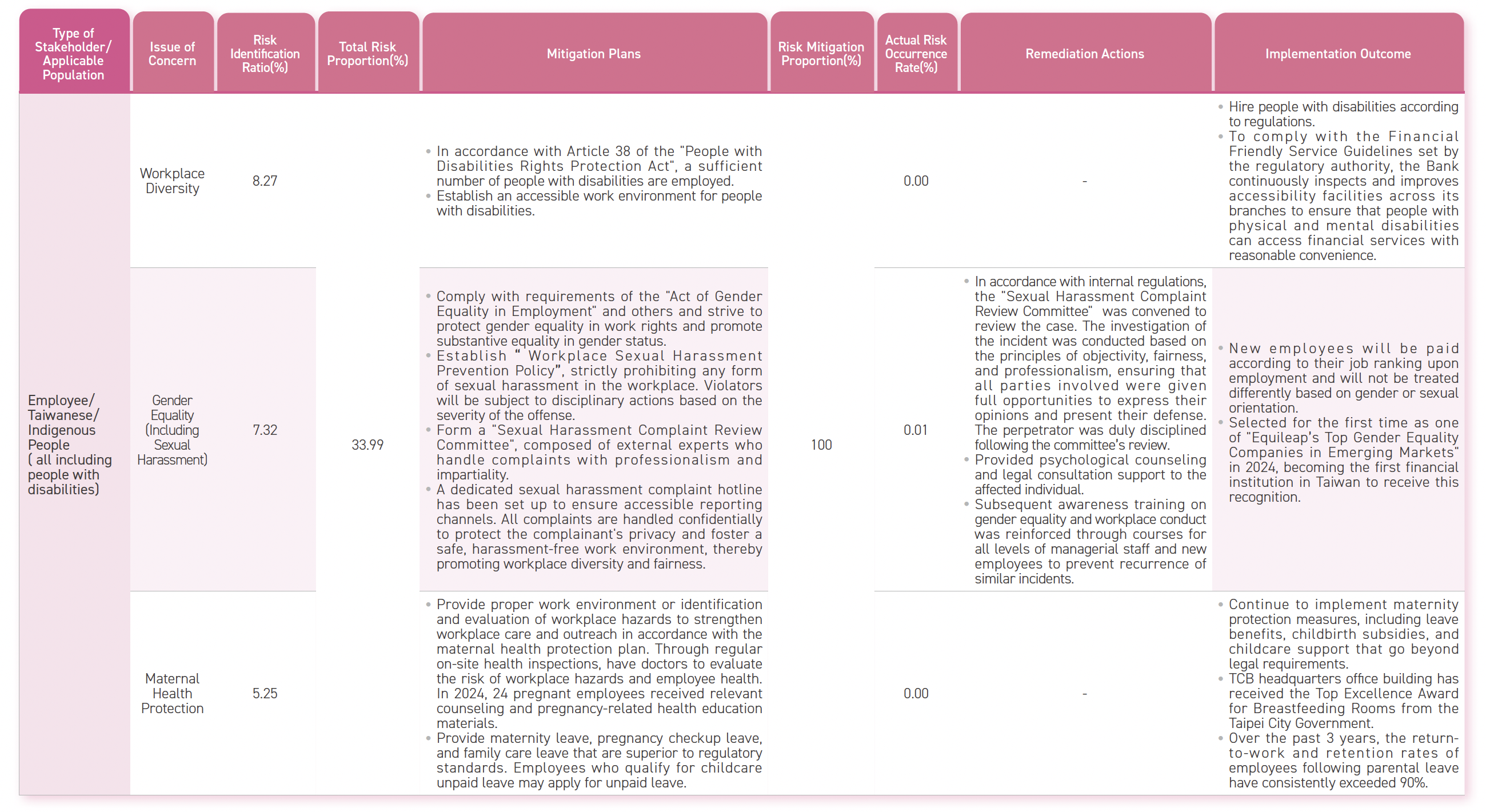
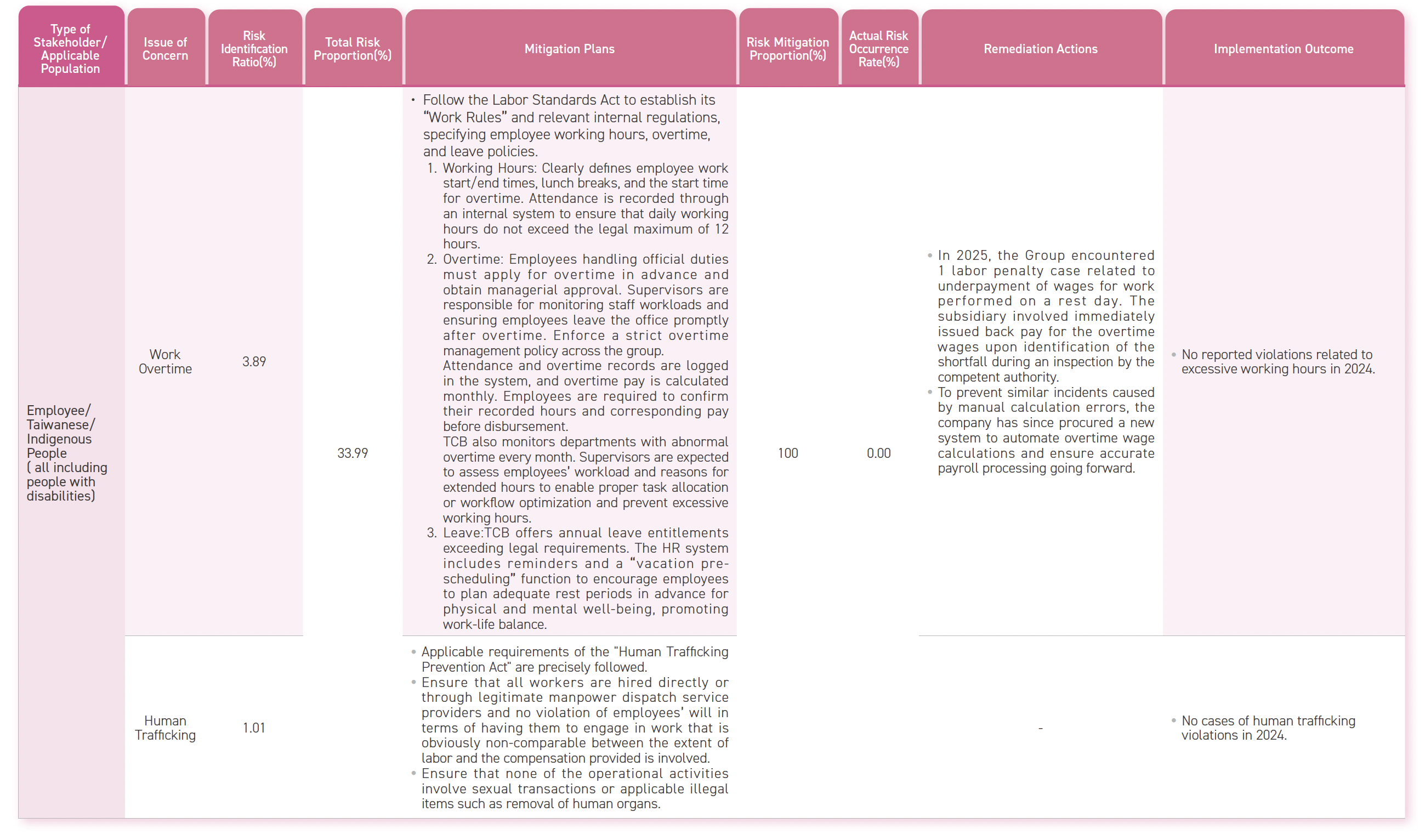
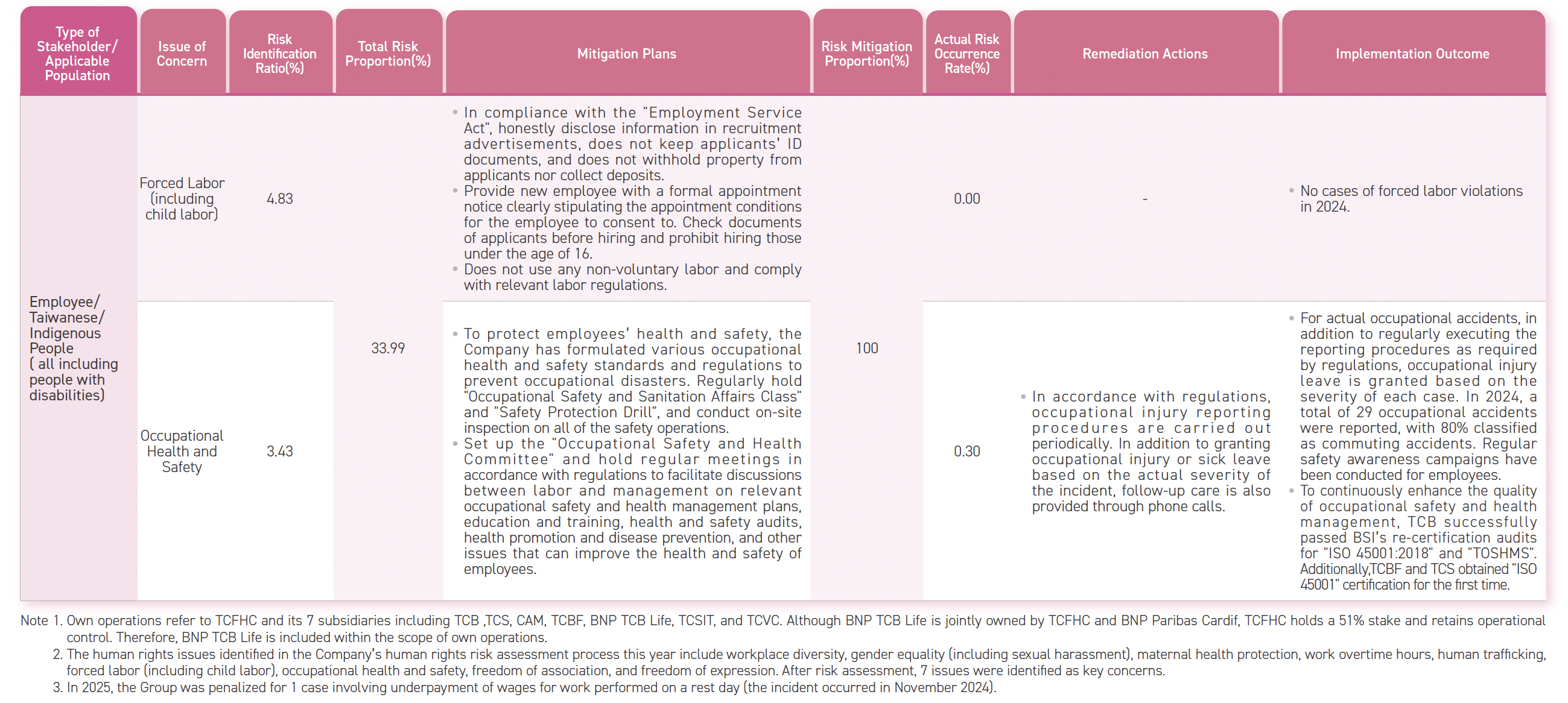
Employer-Employee Relations
Comprehensive Employer-Employee Communication
TCFHC has established a Human Rights Policy, and the CEO has signed a Human Rights Statement affirming the commitment to respect employees’ freedom of association and related rights. In practice, employees are not restricted from participating in clubs or associations. In accordance with relevant laws and regulations, including the ILO Conventions and Taiwan’s Labor Union Act, employees are free to form and join labor unions. Since the establishment of the Group’s companies, there have been no incidents of violations of freedom of association. After evaluation, it has been determined that there is no significant risk of such violations occurring at any of TCFHC global operation sites.
To create a win-win situation for both labor and management and to safeguard employees’ rights to collective bargaining, each company within the Group holds regular labor-management meetings on a quarterly basis in accordance with the “Guidelines for the Implementation of Labor-Management Meetings”. When necessary, ad hoc labor-management negotiation meetings are also convened outside the regular schedule. Employees may express their opinions through labor union representatives or employee representatives at these meetings, ensuring that the voices of general staff are genuinely heard and responded to the company.
Depending on whether a labor union has been established, labor representatives are elected either by the general assembly of union members or by all employees. Currently, TCB, the largest entity in terms of organizational scale, has 12 labor representatives, while other subsidiaries have between 2~5 labor representatives, all in compliance with the minimum number required by law. In 2024, the Group’s subsidiaries held a total of 32 labor-management (consultation) meetings, with labor representatives attending at a rate exceeding 95%. During these meetings, labor and management engaged in sincere negotiations and fully exchanged views on major labor-related issues, working together to improve work efficiency, enhance employee welfare, and pursue shared business development goals.
TCB signed its first collective agreement with the corporate labor union in 2005, prior to its privatization, making it the only bank at the time to do so before privatization. In 2022, TCB renewed the agreement for the 6th time, and TCS also renewed its collective agreement in the same year. Both agreements have a term of 3 years and include provisions more favorable than legal requirements in areas such as leave entitlements, special leave, retirement and pension systems, employment, transfers, resignation and retirement, compensation and benefits, working hours, occupational safety, and union activities.
TCSIT established a corporate labor union in 2024. However, as the union has been in place for less than a year and has not submitted any proposals, no collective agreement has been signed to date. Regardless of whether a subsidiary within the Group has established a corporate labor union or signed a collective agreement, all subsidiaries have implemented internal personnel regulations (such as work rules or personnel management policies) to ensure that employee rights are protected and not adversely affected due to the absence of a collective agreement.
As of the end of 2024, 3 subsidiaries—TCB, TCS, and TCSIT—have established corporate labor unions. A total of 8,829 employees voluntarily joined these unions, representing 98.29% of the domestic workforce at these subsidiaries, the unionization rate significantly higher than most industry peers, reflecting a strong foundation for harmonious labor relations.
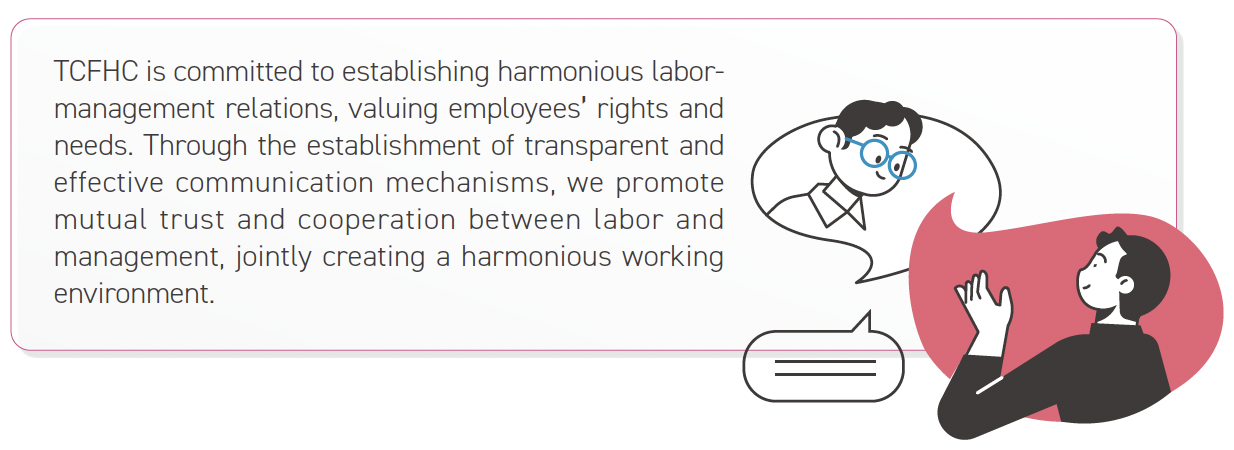
Employee Satisfaction
To understand and listen to employees’ views on management systems, TCFHC regularly conducts employee satisfaction surveys. Beginning in 2021, the Group launched its first Group-wide employee satisfaction survey. Starting in 2022, in an effort to support employees in balancing work and family life, the survey content was adjusted to better capture employees’ workplace experiences. The insights gained serve as a reference for future adjustments to benefits or policies, aiming to enhance employees’ sense of happiness and belonging, and to build a truly employee-centered and happy workplace.
